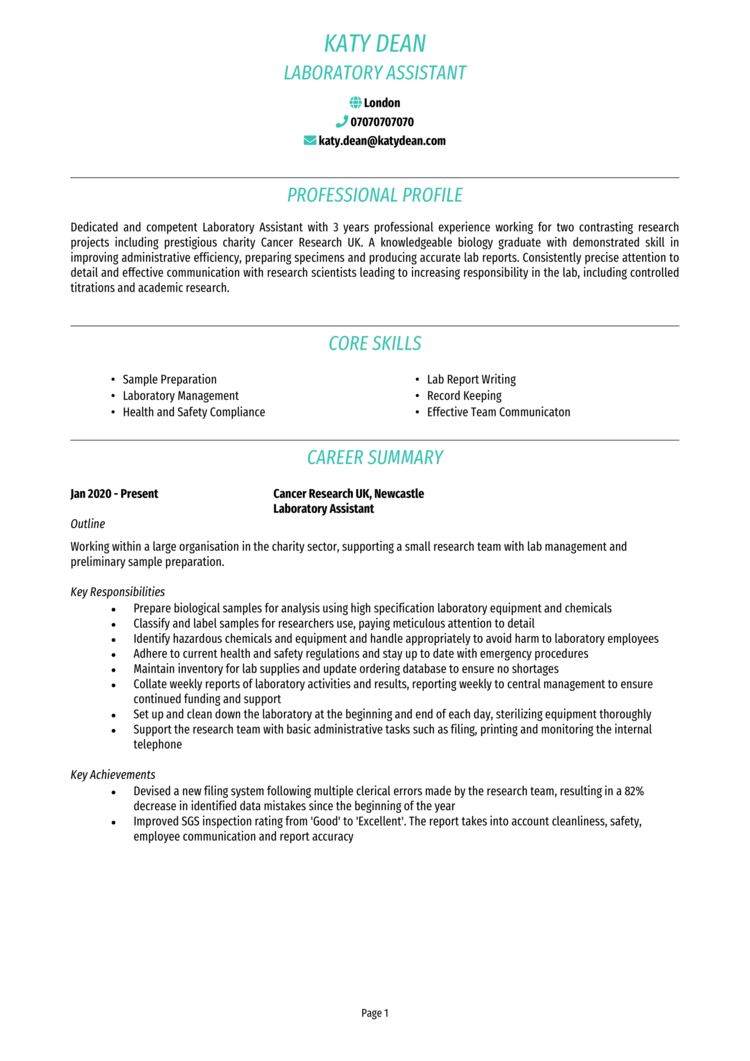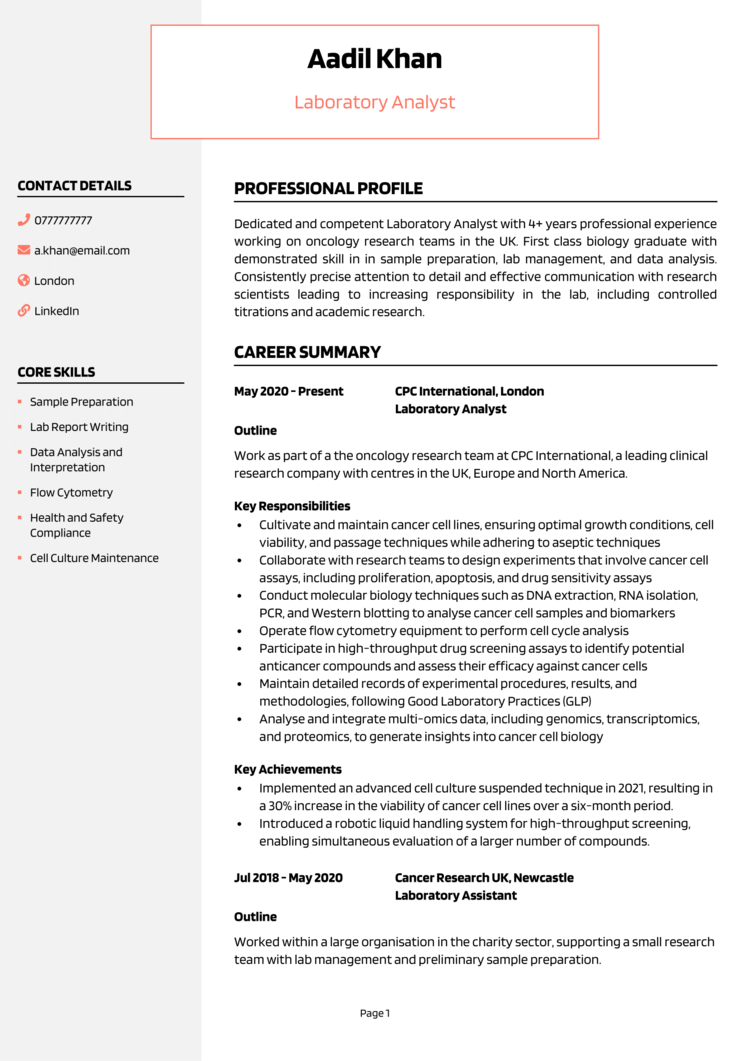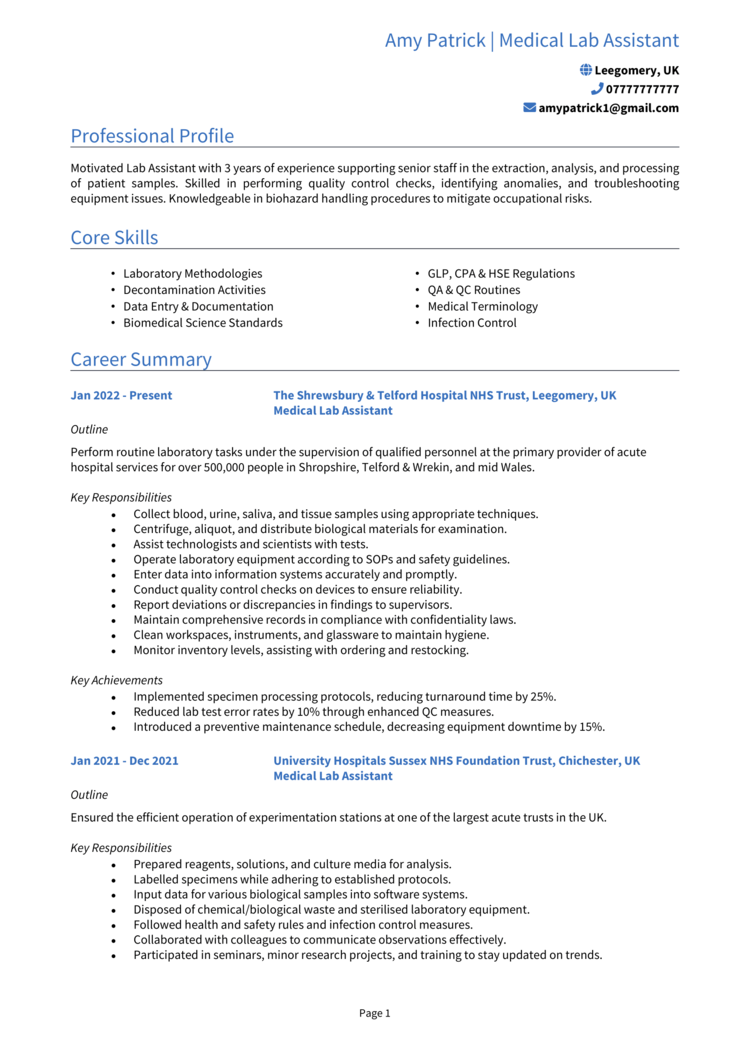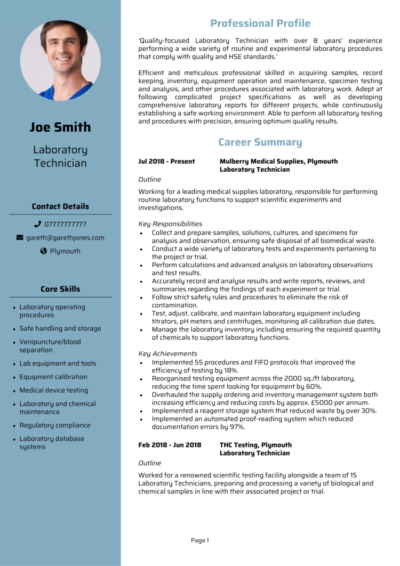Are you ready to experiment with a new Lab Technician job?
Before you start mixing solutions or perfecting protocols, there’s one thing you need to get right first: your CV.
It can be a daunting task but don’t worry, this guide and its Lab Technician CV examples will formulate an application that’s anything but a failed experiment.
Lab Technician CV example

Lab Assistant CV example

Lab Analyst CV example

Medical Lab Assistant CV

How to write your Lab Technician CV
Learn how to create your own interview-winning Lab Technician CV with this simple step-by-step guide.
This guide will walk you through writing a Lab Technician CV that highlights your technical skills and relevant experience. By the end, you’ll have a CV that impresses recruiters and lands you a spot in your next lab.
The best way to structure your Lab Technician CV


Your CV needs to be like a scientific report – if it’s not clear, precise, and organised, you’re not making it past the peer review (or the recruiter). Clarity is essential for the recruiter to see what exactly it is that makes you the perfect fit.
Here’s how to structure your Lab Technician CV:
- Name and contact details – Have these at the top so employers can easily reach you. A photo is optional.
- CV profile – Draw in a potential recruiter with your lab experience, technical expertise, and key achievements.
- Core skills – Focus on hard skills, such as equipment handling or chemical analysis.
- Work experience – List your previous roles in reverse chronological order, with your most recent first.
- Education – Go through the academic history which underpins your expertise in lab work.
- Additional info – This optional section is the place to talk about professional memberships or special training programs, and any relevant hobbies and interests.
Lab Technician CV format


Your CV format should reflect the precision and professionalism you’ll bring to the lab. Get the format right, and you’ll ensure recruiters focus on what really matters – your skills and experience.
Here’s some tips to ensure your CV is clear and professional:
- Bullet points – Break down your key information into skimmable bullet points for quick comprehension.
- Divide sections – Ensure each part of your CV is clearly defined with headings and consistent formatting.
- Use a clear font – Along with an appropriate colour scheme, ensure your font is easy for the recruiter to read.
- Keep it the right length – 2 pages is the perfect length to cover the essentials without getting boring.
CV profile for a Lab Technician


Your CV profile is your opening pitch to recruiters, summarising your technical expertise, lab experience, and areas of specialisation. For Lab Technicians, it’s also a chance to prove your precision and problem-solving abilities.
Lab Technician CV profile examples
Profile 1
Experienced Lab Technician with six years in pharmaceutical research, focusing on sample analysis and equipment calibration. Skilled in maintaining strict adherence to quality control protocols and using advanced analytical tools such as HPLC and GC-MS.
Profile 2
Proficient Lab Technician with three years of experience in academic research labs, supporting projects in molecular biology and genetics. Adept at preparing reagents, conducting PCR assays, and maintaining meticulous records of experiments. Familiar with LIMS software for efficient data management.
Profile 3
Dedicated Lab Technician with over a decade of experience in clinical diagnostics, specialising in pathology and haematology. Expertise in sample preparation, automated analyser operation, and ensuring compliance with laboratory accreditation standards.
What to include in your Lab Technician CV profile
Tailor your profile to the role, referencing key skills and achievements that align with the job description.
Here’s what to include in your Lab Technician CV profile:
- Where you’ve worked – Mention the types of labs or organisations you’ve worked for, like medical, pharmaceutical, or research labs.
- Your top qualifications – Highlight academic achievements like a degree in biology or chemistry, and relevant certifications such as GLP or lab safety training.
- Essential skills – Include core abilities like sample analysis, data recording, or equipment calibration.
- People you’ve worked with – Reference collaboration with researchers, scientists, or medical professionals.
- Relevant tools you know – Mention expertise with lab equipment like spectrometers, chromatographs, or centrifuges.
- Specialised techniques you know – Highlight skills such as titration, aseptic technique, or spectrophotometry.
- Laboratory environments you’ve worked in – Reference specific settings like cleanrooms, microbiology labs, or chemical research facilities.
- Quality standards you’ve followed – Include compliance with ISO or GLP standards.
- Projects you’ve supported – Mention key contributions to research studies or product development.
Core skills section


The core skills section is your CV’s equipment rack – it shows recruiters exactly what tools and techniques you’re going to be bringing to their lab. As a Lab Technician, this is where you highlight your technical expertise and lab know-how, giving them a quick snapshot of why you’re the right candidate for the role.
Focus on specific skills that align with the job description. Whether it’s effective titration for a chemical lab role or performing aseptic sampling in a microbiology setting, tailor your skills to reflect the demands of the role.
Top skills for your Lab Technician CV
- Sample Preparation – Handling and preparing biological, chemical, or physical samples for analysis.
- Equipment Calibration – Maintaining and calibrating lab equipment to ensure accurate results.
- Chemical Analysis – Performing qualitative and quantitative tests to identify compounds.
- Data Recording – Documenting findings in compliance with regulatory standards.
- Microscopy Techniques – Operating light and electron microscopes for detailed examinations.
- Chromatography and Spectrometry – Conducting advanced testing for chemical composition.
- Good Laboratory Practice (GLP) – Adhering to quality standards for safety and accuracy.
- Safety Protocols – Implementing and following procedures to maintain a safe lab environment.
- Reagent Preparation – Creating solutions and reagents for experiments.
- Team Collaboration – Coordinating with researchers and technicians to meet project goals.
Work experience


Your work experience section is where you show recruiters how you’ve applied your skills in a real lab setting. You’ll need to highlight your responsibilities, such as conducting experiments, maintaining equipment, or ensuring compliance with safety standards, as well as your proudest achievements.
List your roles in reverse chronological order, starting with your most recent position. Don’t have much experience? That’s fine: focus on your favourite university modules or lab projects that demonstrated your abilities.
How should you list jobs on your Lab Technician CV?

- Outline – Provide an overview of the lab or organisation, your role, and the type of work you handled.
- Responsibilities – Highlight duties like sample analysis, equipment maintenance, or assisting researchers. Use action verbs like “prepared,” or “analysed,”, along with more specialist terms.
- Achievements – Showcase measurable outcomes, like improving efficiency or producing reliable results – numbers look great here.
Example jobs for Lab Technician
Lab Technician | L&M Pharmaceuticals
Outline
Performed analytical testing for a pharmaceutical company, ensuring accurate results to support drug development. Maintained laboratory equipment and adhered to GMP standards.
Responsibilities
- Prepared and tested samples using HPLC and UV-Vis spectroscopy.
- Calibrated and maintained analytical instruments to ensure accurate measurements.
- Documented results in line with GMP and regulatory requirements.
- Conducted stability testing on pharmaceutical products and reported findings.
- Monitored laboratory inventory and ordered supplies as needed.
Achievements
- Reduced instrument downtime by 20% through proactive maintenance.
- Improved test accuracy by 15% by optimising sample preparation procedures.
- Trained 3 junior technicians on lab protocols and equipment handling.
Assistant Lab Technician | University of Roehampton
Outline
Supported research in a university molecular biology lab, conducting experiments and maintaining equipment. Played a key role in ensuring accurate data collection for publications.
Responsibilities
- Prepared reagents and solutions for PCR, gel electrophoresis, and cloning experiments.
- Maintained laboratory equipment, including centrifuges and thermal cyclers.
- Managed sample storage and organisation to ensure traceability.
- Recorded and analysed experimental data, presenting findings to research teams.
- Adhered to health and safety protocols, including proper handling of hazardous materials.
Achievements
- Optimised PCR protocols, reducing reaction failure rates by 10%.
- Streamlined sample management processes, saving 5 hours of work weekly.
- Contributed to a published paper by generating high-quality experimental data.
Senior Lab Technician | Birmingham City Hospital
Outline
Performed diagnostic testing in a hospital pathology lab, focusing on haematology and biochemistry. Ensured timely and accurate results for patient care.
Responsibilities
- Prepared and processed blood and tissue samples for analysis.
- Operated and maintained automated analysers, ensuring consistent performance.
- Monitored quality control metrics and recalibrated instruments when necessary.
- Liaised with medical staff to discuss urgent or unusual test results.
- Updated patient records in accordance with GDPR and NHS guidelines.
Achievements
- Improved turnaround time for urgent tests by 15% through workflow optimisation.
- Implemented a new quality control procedure, reducing error rates by 25%.
- Received commendation from senior staff for consistently delivering accurate results.
How to write your education section


The education section highlights the qualifications that have prepared you for a Lab Technician role. Include relevant degrees, certifications, and any specialised training.
This section is typically brief since your work experience carries more weight. Ensure your qualifications are listed in reverse chronological order, starting with the most recent.
What qualifications do employers look for in a Lab Technician?
- Bachelor of Science (BSc) in Biology, Chemistry, or a related field – Provides a strong foundation in scientific principles.
- NVQ Level 3 in Laboratory and Associated Technical Activities – Hands-on training for lab operations.
- Good Laboratory Practice (GLP) Certification – Ensures adherence to industry safety and quality standards.
- HND in Applied Sciences – Focuses on practical skills for technical roles.
- City & Guilds Certificate in Clinical Skills – Offers comprehensive training for lab-based careers.





